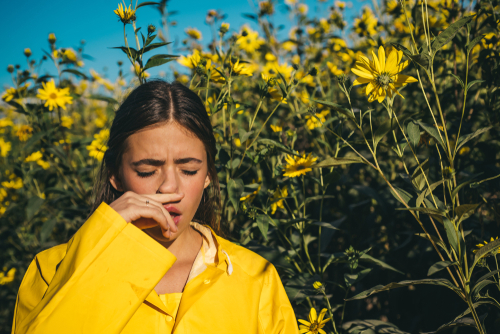Can Allergies Make My Eyes Drier?

Millions of adults in the U.S. experience allergies and dry eyes each year. Allergies occur when your immune system reacts to substances it considers dangerous even though they’re typically harmless.
The chemicals released to fight the ‘invader’ trigger symptoms associated with allergies. Dry eyes occur when your tears evaporate too fast or when you don’t produce adequate tears.
While many things can exacerbate your dry eyes, allergies particularly stand out. Keep reading to find out if allergies can make your eyes drier!
How Do Allergies Make Your Dry Eyes Worse?
Dry eyes share symptoms with allergies like:
- Grittiness
- Redness
- Blurred vision
- Eye fatigue
- Sensitivity to light
- Excessive watering
- Itchiness
Your body releases a substance called histamine if your eyes are sensitive to pet dander, pollen, and other allergens. With the release of histamine, your body’s natural response is red, itchy, and watery eyes.
Dry eye symptoms often worsen when you spend more time outside during allergy season. Exposure to the sun, dust, sweat, and sunscreen can further irritate your eyes.
Pollen during allergy season also worsens your existing dry eye symptoms. In some instances, you may have dry eyes and allergies simultaneously.
Having allergy and dry eye symptoms at the same time can negatively affect your eyes.
Getting Allergy Testing if You Think You Have Allergies
If you’re suffering from allergy symptoms, you may be a good candidate for allergy testing. At Short Hills Ophthalmology, we offer allergy testing at both of our locations.
Many people suspect that they have allergies, but they have no idea what they are allergic to. Getting allergy testing can help you be proactive and feel better.
If you’re allergic to dust mites, undergoing testing can help you find out that you need to change out your pillowcases more often than others. Another benefit of allergy testing is if you find out you’re allergic to a certain kind of pollen, you can know when that pollen is strongest where you live, reducing how much time you’re spending outdoors.
How To Reduce Dry Eye Symptoms
Whether you’re allergic to pollen, dust, or pet dander, the following tips can help limit your dry eye symptoms:
Avoid Rubbing Itchy Eyes
Many people experience a surge in their dry eye symptoms such as itchy, sore eyes when there’s a lot of pollen in the air. You may feel like rubbing your eyes to find relief from the irritation.
Rubbing your eyes is the worst thing you can do and should be avoided. Although rubbing may offer short-lived relief from your symptoms, it can result in more discomfort and pain.
Aggressive and persistent rubbing can also damage your eyes. It may even introduce bacteria that can lead to eye infections.
To deal with your itchy eyes, use over-the-counter or prescription eye drops and stay away from places with high pollen counts.
Monitor the Pollen Count
You can keep track of the pollen levels by downloading an app from the Weather Channel to your smartphone or tablet. When the count is high, spend more time indoors.
Keep doors and windows shut to avoid dry eye and allergy symptoms flaring up.
Clean Your Living Space
Maintaining a clean-living space is the best way to remove any dust, pollen, and pet dander from your home. The less contact you have with these allergens, the more you can reduce your allergy and dry eye symptoms.
When dusting, use a moist cloth. Allergens will stick to the damp cloth while stopping them from spreading in the air.
Protect Your Eyes When You’re Outside
Quality sunglasses shield your eyes against the sun’s harmful UV rays. They also protect your eyes from pollen and dust particles.
Reducing your exposure to allergens will help keep your symptoms under control.
Find Relief for Your Dry Eyes
If your dry eyes have become more intense and the above tips aren’t helping, talk to the eye doctors at Short Hills Ophthalmology. Our experienced eye care team will accurately diagnose your dry eyes and provide a highly-individualized treatment plan to provide long-term relief.
Schedule an appointment at Short Hills Ophthalmology in Short Hills and Clifton, NJ, to improve your allergy symptoms this season!



